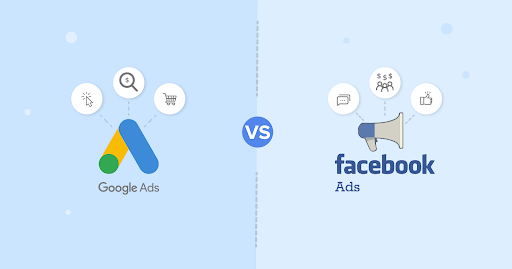Table of Contents
Introduction
As online advertising continues to evolve, businesses increasingly rely on platforms like Google Ads and Facebook Ads to reach their target audience. While both advertising giants have their strengths, understanding their differences can help you make an informed decision.
This guide covers various aspects such as conversion rates, targeting capabilities, cost structures, and practical tips for both platforms. Whether you’re looking at Google Ads and Facebook Ads or considering Google Shopping Ads vs Facebook Ads Reddit comparisons, this article provides a complete analysis.
Google Ads Overview
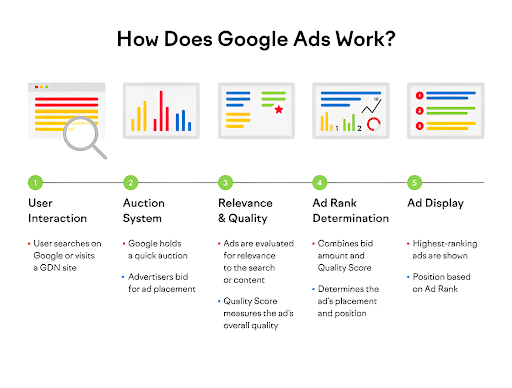
Google Ads, formerly Google AdWords, is Google’s advertising platform allowing businesses to display ads across Google’s search engine and other Google-owned properties like YouTube and Gmail.
- Through Google Ads, businesses can target users who are actively searching for specific products or services, making it a highly effective tool for demand-driven advertising.
- Google Ads operate based on a pay-per-click (PPC) model, where advertisers bid on keywords related to their products or services.
- Google Ads Auction Insights shows how advertisers’ bids compare to those of their competitors.
- Advertisers pay only when a user clicks on their ad, which makes it a highly efficient way to target potential customers.
Facebook Ads Overview
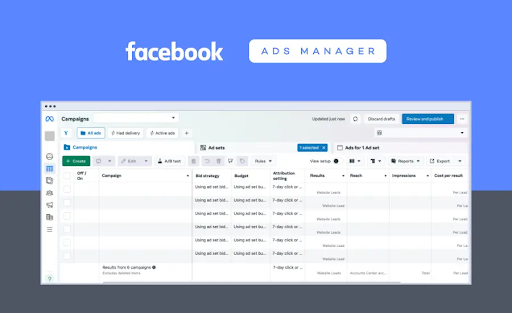
Facebook Ads, part of Meta’s advertising network, allows advertisers to reach users based on demographics, interests, behaviors, and more.
- Unlike Google Ads, which target users based on search intent, Facebook Ads are displayed to users based on their online behavior and profile data.
- Facebook Ads provide access to Instagram as well, extending their reach to over 2.8 billion monthly active users across platforms.
- Facebook Ads Manager is the tool used to create, monitor, and manage campaigns.
- Businesses can leverage a range of ad formats, including video, carousel, and image ads.
- Facebook’s strength lies in its detailed targeting options, allowing advertisers to reach very specific audiences.
Google Ads vs Facebook Ads: Key Differences
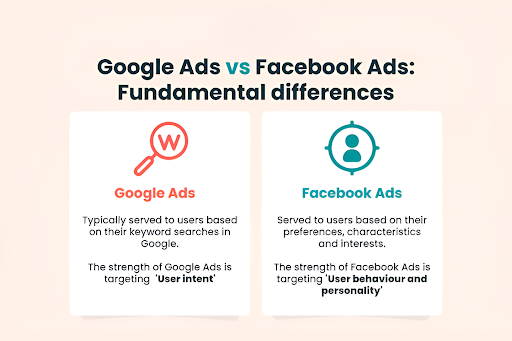
Targeting Capabilities
The fundamental difference between Google Ads and Facebook Ads is how they target users.
- Google Ads rely on search intent, allowing businesses to target users actively looking for products or services. You can use Google Ads Keyword Tool to identify relevant keywords and optimize your ad campaigns.
- On the other hand, Facebook Ads allow advertisers to target users based on their interests, behaviors, location, and demographic data.
- For example, if you’re targeting real estate agents, Facebook Ads for real estate agents in 2023 allow precise demographic targeting. Facebook Ads for nonprofits and small businesses also benefit from the platform’s robust targeting features.
Ad Formats
Google Ads offers several types of ads, including search ads, display ads, video ads (YouTube), and shopping ads.
- Google’s shopping ads are particularly useful for e-commerce businesses looking to display product listings directly in search results.
- In contrast, Facebook Ads provide a variety of visually rich formats, such as video, carousel, and collection ads.
- These formats are great for storytelling and building brand awareness. Facebook Ads for Shopify store owners, for instance, are highly effective because they visually engage customers with product images and descriptions.
Cost Comparison
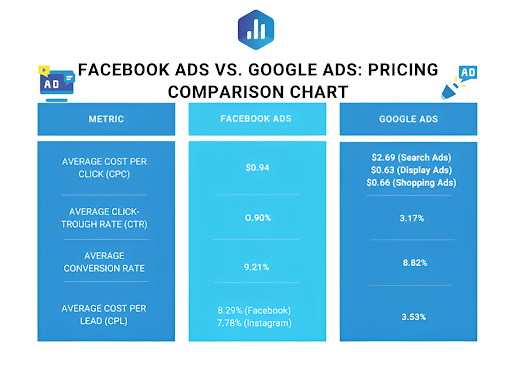
When comparing Google Ads cost with Facebook Ads, it’s important to note that Google Ads typically have a higher cost-per-click (CPC) due to the competitive nature of keyword bidding.
- However, the cost is justified by the high intent of users who click on the ads.
- Facebook Ads, in contrast, generally have lower CPC rates but may require a more significant investment to generate a similar volume of conversions, depending on the business model.
- Facebook Ads benchmarks show that while CPC is lower, costs can accumulate when targeting broader audiences.
- If you’re a nonprofit, you might benefit from the Google Ads Grant, which offers up to $10,000 per month in free advertising for eligible organizations.
- Facebook, on the other hand, has Facebook Ads Grants, though these are less commonly discussed than Google’s version.
Conversion Rates
When it comes to conversion rates, businesses often ask, are Google Ads or Facebook Ads better? The answer depends on your goals. Google Ads typically convert better for businesses focusing on direct sales because users are searching with intent.
- For example, Google Ads local campaigns perform exceptionally well for local service providers.
- Facebook Ads may have lower conversion rates but are better suited for brand awareness campaigns.
- For instance, Facebook Ads for realtors allow agents to build relationships with potential buyers through engaging content, although the conversion may come later in the buying process.
Best Practices for Running Ads on Both Platforms
Google Ads Best Practices
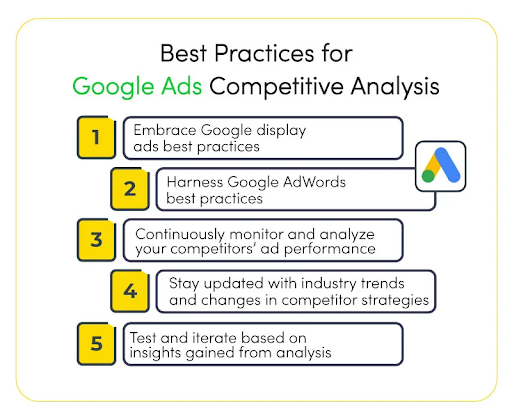
- Use Google Ads Analytics to measure and track the performance of your ads.
- Implement Google Ads extensions to provide additional value, such as phone numbers, addresses, or extra links.
- Monitor your ads through Google Ads Auction Insights to compare your ad’s visibility with competitors.
- Use Google Ads tools like the Google Ads keyword tool to optimize your campaign.
- Optimize for cost-efficiency by closely monitoring your Google Ads cost per click (CPC).
Facebook Ads Best Practices
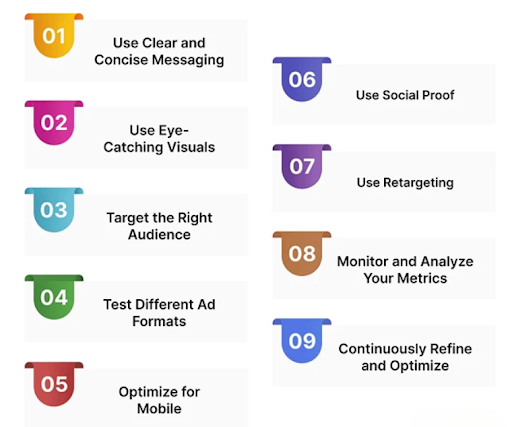
- Utilize Facebook Ads Manager to set up precise targeting based on user behavior, location, and interests.
- Follow Facebook Ads specs to ensure your ad creatives are optimized for mobile and desktop platforms.
- Use Facebook Ads placements strategically, mixing News Feed ads with Instagram Stories for broader reach.
- Leverage the Facebook Ads video specs to create engaging, attention-grabbing video content.
- Stay updated with Facebook Ads policies to ensure compliance and avoid rejection.
Challenges and Troubleshooting
Facebook Ads
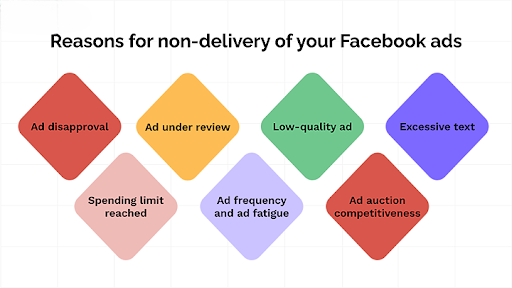
Ad Disapproval
- Challenge: Ads getting rejected due to policy violations.
- Troubleshooting: Review Facebook’s Ad Policy to ensure compliance. Common issues include inappropriate content, false claims, and prohibited products. Modify the content or format to meet the requirements.
Low Ad Reach
- Challenge: Despite a good ad, the audience reach is limited.
- Troubleshooting: Expand the audience size, adjust targeting parameters, or increase the budget. Ensure the relevance score is high by improving engagement metrics.
High Cost-Per-Click (CPC)
- Challenge: Higher than expected costs for clicks or conversions.
- Troubleshooting: Narrow down the target audience, improve ad relevance, or test different ad formats. Focus on A/B testing and optimizing creative for better results.
Ad Fatigue
- Challenge: Over time, performance drops as the same ad is shown repeatedly.
- Troubleshooting: Regularly update ad creatives and copy. Rotate between different formats and experiment with new campaigns to refresh the user experience.
Google Ads
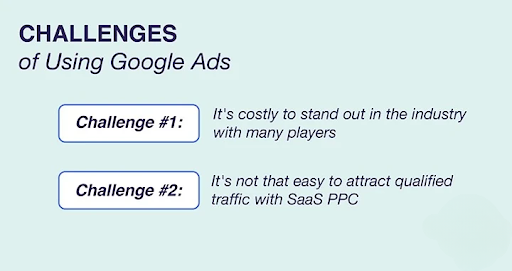
Low-Quality Score
- Challenge: Poor Quality Score leads to higher costs and less visibility.
- Troubleshooting: Improve the relevance of your keywords, landing page, and ad copy. Focus on delivering a great user experience by optimizing page load speed and content quality.
High Cost-Per-Click (CPC)
- Challenge: Increased competition leads to expensive CPC.
- Troubleshooting: Refine your keyword strategy. Focus on long-tail keywords and optimize your bidding strategy. Implement negative keywords to filter out irrelevant searches.
Low Click-Through Rate (CTR)
- Challenge: Users are not clicking on your ads.
- Troubleshooting: Improve your ad copy to be more compelling. Use strong calls to action (CTA), highlight unique selling points, and A/B test different versions of your ads.
Low Conversion Rate
- Challenge: Ads are getting clicks but few conversions.
- Troubleshooting: Optimize your landing pages for conversions. Ensure the landing page is relevant to the ad, has a clear CTA, and provides an easy path to conversion.
Which Platform is Better for Your Business?
The decision of whether to choose Google Ads or Facebook Ads depends on your business goals:
- Google Ads are ideal for businesses that rely on search intent, such as service providers or B2B companies. Google Ads local campaigns are effective for targeting nearby customers.
- Facebook Ads are perfect for businesses looking to build relationships with their audience, such as retail, fashion, and real estate.
Conclusion
Google Ads vs Facebook Ads, both platforms offer unique advantages depending on your goals. Google Ads excel in intent-based marketing, targeting users actively searching for products, while Facebook Ads shine in building brand awareness and engaging audiences based on their interests and behaviors.
Whether you’re focused on Facebook Ads for local businesses, Google Ads types, or exploring Google Shopping Ads vs Facebook Ads Reddit comparisons, the key is aligning your advertising strategy with your business objectives. By understanding the nuances of both platforms, you can create effective campaigns that maximize your advertising budget and drive results.
Deepak Wadhwani has over 20 years experience in software/wireless technologies. He has worked with Fortune 500 companies including Intuit, ESRI, Qualcomm, Sprint, Verizon, Vodafone, Nortel, Microsoft and Oracle in over 60 countries. Deepak has worked on Internet marketing projects in San Diego, Los Angeles, Orange Country, Denver, Nashville, Kansas City, New York, San Francisco and Huntsville. Deepak has been a founder of technology Startups for one of the first Cityguides, yellow pages online and web based enterprise solutions. He is an internet marketing and technology expert & co-founder for a San Diego Internet marketing company.

